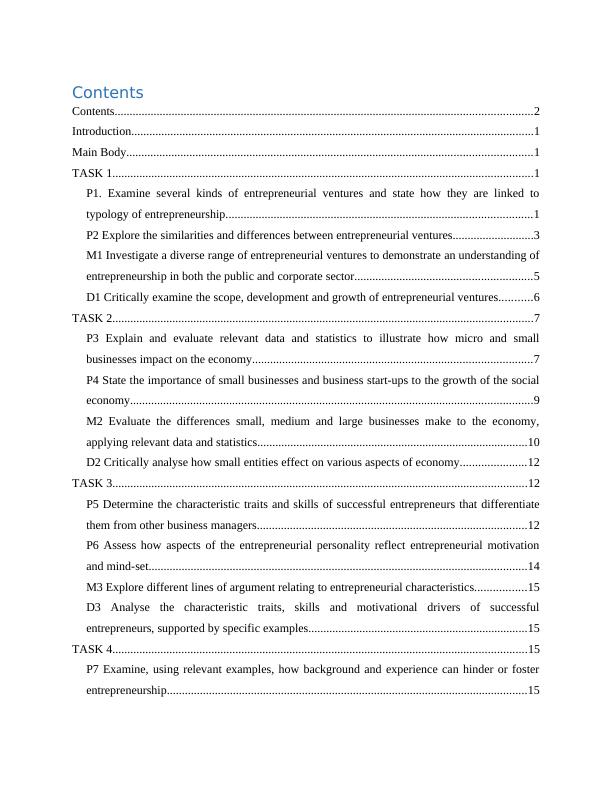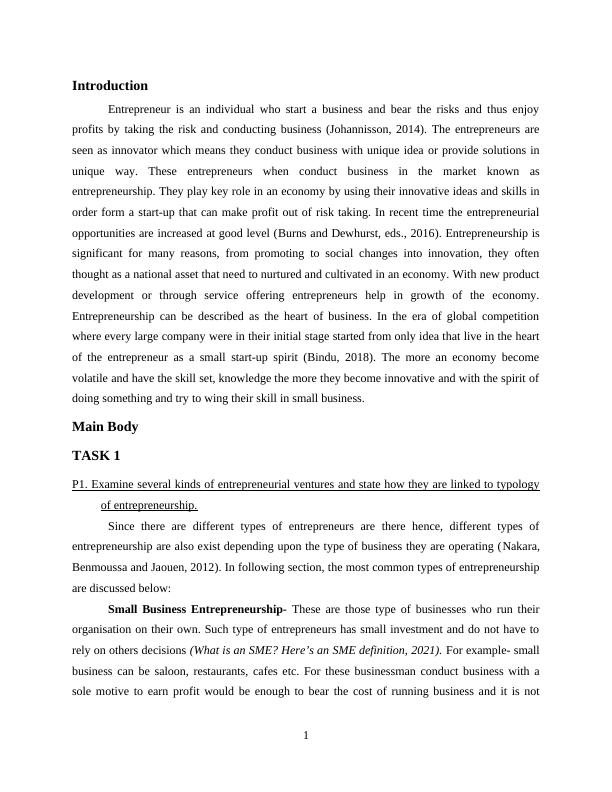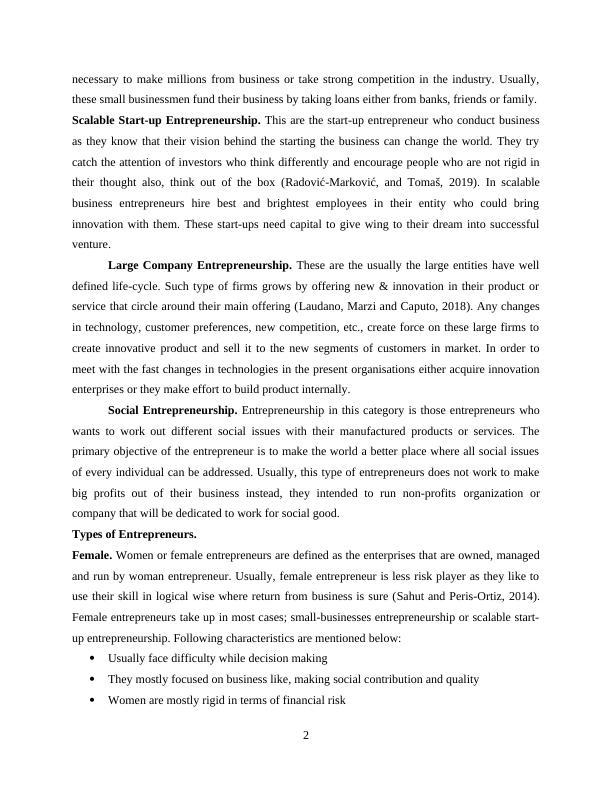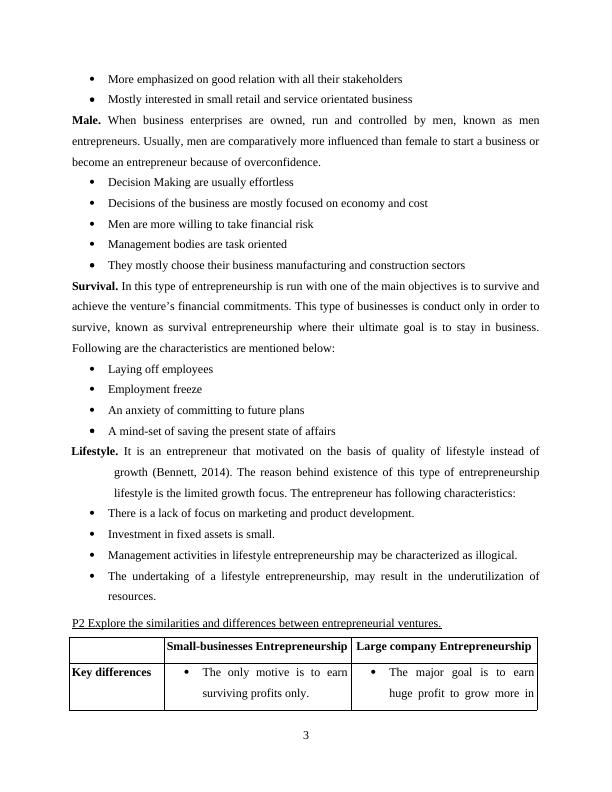Entrepreneurship and Small Business Management
Added on 2022-12-26
22 Pages6730 Words71 Views
Entrepreneurship and Small
Business Management
Business Management

Contents
Contents...........................................................................................................................................2
Introduction......................................................................................................................................1
Main Body.......................................................................................................................................1
TASK 1............................................................................................................................................1
P1. Examine several kinds of entrepreneurial ventures and state how they are linked to
typology of entrepreneurship......................................................................................................1
P2 Explore the similarities and differences between entrepreneurial ventures...........................3
M1 Investigate a diverse range of entrepreneurial ventures to demonstrate an understanding of
entrepreneurship in both the public and corporate sector...........................................................5
D1 Critically examine the scope, development and growth of entrepreneurial ventures...........6
TASK 2............................................................................................................................................7
P3 Explain and evaluate relevant data and statistics to illustrate how micro and small
businesses impact on the economy.............................................................................................7
P4 State the importance of small businesses and business start-ups to the growth of the social
economy......................................................................................................................................9
M2 Evaluate the differences small, medium and large businesses make to the economy,
applying relevant data and statistics..........................................................................................10
D2 Critically analyse how small entities effect on various aspects of economy......................12
TASK 3..........................................................................................................................................12
P5 Determine the characteristic traits and skills of successful entrepreneurs that differentiate
them from other business managers..........................................................................................12
P6 Assess how aspects of the entrepreneurial personality reflect entrepreneurial motivation
and mind-set..............................................................................................................................14
M3 Explore different lines of argument relating to entrepreneurial characteristics.................15
D3 Analyse the characteristic traits, skills and motivational drivers of successful
entrepreneurs, supported by specific examples.........................................................................15
TASK 4..........................................................................................................................................15
P7 Examine, using relevant examples, how background and experience can hinder or foster
entrepreneurship........................................................................................................................15
Contents...........................................................................................................................................2
Introduction......................................................................................................................................1
Main Body.......................................................................................................................................1
TASK 1............................................................................................................................................1
P1. Examine several kinds of entrepreneurial ventures and state how they are linked to
typology of entrepreneurship......................................................................................................1
P2 Explore the similarities and differences between entrepreneurial ventures...........................3
M1 Investigate a diverse range of entrepreneurial ventures to demonstrate an understanding of
entrepreneurship in both the public and corporate sector...........................................................5
D1 Critically examine the scope, development and growth of entrepreneurial ventures...........6
TASK 2............................................................................................................................................7
P3 Explain and evaluate relevant data and statistics to illustrate how micro and small
businesses impact on the economy.............................................................................................7
P4 State the importance of small businesses and business start-ups to the growth of the social
economy......................................................................................................................................9
M2 Evaluate the differences small, medium and large businesses make to the economy,
applying relevant data and statistics..........................................................................................10
D2 Critically analyse how small entities effect on various aspects of economy......................12
TASK 3..........................................................................................................................................12
P5 Determine the characteristic traits and skills of successful entrepreneurs that differentiate
them from other business managers..........................................................................................12
P6 Assess how aspects of the entrepreneurial personality reflect entrepreneurial motivation
and mind-set..............................................................................................................................14
M3 Explore different lines of argument relating to entrepreneurial characteristics.................15
D3 Analyse the characteristic traits, skills and motivational drivers of successful
entrepreneurs, supported by specific examples.........................................................................15
TASK 4..........................................................................................................................................15
P7 Examine, using relevant examples, how background and experience can hinder or foster
entrepreneurship........................................................................................................................15

M4 Analyse the link between entrepreneurial characteristics and the influence of personal
background and experience to specific successful entrepreneurs.............................................16
D4 Critically analyse from background and experience influences entrepreneurs...................17
Conclusion.....................................................................................................................................17
References......................................................................................................................................18
background and experience to specific successful entrepreneurs.............................................16
D4 Critically analyse from background and experience influences entrepreneurs...................17
Conclusion.....................................................................................................................................17
References......................................................................................................................................18

Introduction
Entrepreneur is an individual who start a business and bear the risks and thus enjoy
profits by taking the risk and conducting business (Johannisson, 2014). The entrepreneurs are
seen as innovator which means they conduct business with unique idea or provide solutions in
unique way. These entrepreneurs when conduct business in the market known as
entrepreneurship. They play key role in an economy by using their innovative ideas and skills in
order form a start-up that can make profit out of risk taking. In recent time the entrepreneurial
opportunities are increased at good level (Burns and Dewhurst, eds., 2016). Entrepreneurship is
significant for many reasons, from promoting to social changes into innovation, they often
thought as a national asset that need to nurtured and cultivated in an economy. With new product
development or through service offering entrepreneurs help in growth of the economy.
Entrepreneurship can be described as the heart of business. In the era of global competition
where every large company were in their initial stage started from only idea that live in the heart
of the entrepreneur as a small start-up spirit (Bindu, 2018). The more an economy become
volatile and have the skill set, knowledge the more they become innovative and with the spirit of
doing something and try to wing their skill in small business.
Main Body
TASK 1
P1. Examine several kinds of entrepreneurial ventures and state how they are linked to typology
of entrepreneurship.
Since there are different types of entrepreneurs are there hence, different types of
entrepreneurship are also exist depending upon the type of business they are operating (Nakara,
Benmoussa and Jaouen, 2012). In following section, the most common types of entrepreneurship
are discussed below:
Small Business Entrepreneurship- These are those type of businesses who run their
organisation on their own. Such type of entrepreneurs has small investment and do not have to
rely on others decisions (What is an SME? Here’s an SME definition, 2021). For example- small
business can be saloon, restaurants, cafes etc. For these businessman conduct business with a
sole motive to earn profit would be enough to bear the cost of running business and it is not
1
Entrepreneur is an individual who start a business and bear the risks and thus enjoy
profits by taking the risk and conducting business (Johannisson, 2014). The entrepreneurs are
seen as innovator which means they conduct business with unique idea or provide solutions in
unique way. These entrepreneurs when conduct business in the market known as
entrepreneurship. They play key role in an economy by using their innovative ideas and skills in
order form a start-up that can make profit out of risk taking. In recent time the entrepreneurial
opportunities are increased at good level (Burns and Dewhurst, eds., 2016). Entrepreneurship is
significant for many reasons, from promoting to social changes into innovation, they often
thought as a national asset that need to nurtured and cultivated in an economy. With new product
development or through service offering entrepreneurs help in growth of the economy.
Entrepreneurship can be described as the heart of business. In the era of global competition
where every large company were in their initial stage started from only idea that live in the heart
of the entrepreneur as a small start-up spirit (Bindu, 2018). The more an economy become
volatile and have the skill set, knowledge the more they become innovative and with the spirit of
doing something and try to wing their skill in small business.
Main Body
TASK 1
P1. Examine several kinds of entrepreneurial ventures and state how they are linked to typology
of entrepreneurship.
Since there are different types of entrepreneurs are there hence, different types of
entrepreneurship are also exist depending upon the type of business they are operating (Nakara,
Benmoussa and Jaouen, 2012). In following section, the most common types of entrepreneurship
are discussed below:
Small Business Entrepreneurship- These are those type of businesses who run their
organisation on their own. Such type of entrepreneurs has small investment and do not have to
rely on others decisions (What is an SME? Here’s an SME definition, 2021). For example- small
business can be saloon, restaurants, cafes etc. For these businessman conduct business with a
sole motive to earn profit would be enough to bear the cost of running business and it is not
1

necessary to make millions from business or take strong competition in the industry. Usually,
these small businessmen fund their business by taking loans either from banks, friends or family.
Scalable Start-up Entrepreneurship. This are the start-up entrepreneur who conduct business
as they know that their vision behind the starting the business can change the world. They try
catch the attention of investors who think differently and encourage people who are not rigid in
their thought also, think out of the box (Radović-Marković, and Tomaš, 2019). In scalable
business entrepreneurs hire best and brightest employees in their entity who could bring
innovation with them. These start-ups need capital to give wing to their dream into successful
venture.
Large Company Entrepreneurship. These are the usually the large entities have well
defined life-cycle. Such type of firms grows by offering new & innovation in their product or
service that circle around their main offering (Laudano, Marzi and Caputo, 2018). Any changes
in technology, customer preferences, new competition, etc., create force on these large firms to
create innovative product and sell it to the new segments of customers in market. In order to
meet with the fast changes in technologies in the present organisations either acquire innovation
enterprises or they make effort to build product internally.
Social Entrepreneurship. Entrepreneurship in this category is those entrepreneurs who
wants to work out different social issues with their manufactured products or services. The
primary objective of the entrepreneur is to make the world a better place where all social issues
of every individual can be addressed. Usually, this type of entrepreneurs does not work to make
big profits out of their business instead, they intended to run non-profits organization or
company that will be dedicated to work for social good.
Types of Entrepreneurs.
Female. Women or female entrepreneurs are defined as the enterprises that are owned, managed
and run by woman entrepreneur. Usually, female entrepreneur is less risk player as they like to
use their skill in logical wise where return from business is sure (Sahut and Peris-Ortiz, 2014).
Female entrepreneurs take up in most cases; small-businesses entrepreneurship or scalable start-
up entrepreneurship. Following characteristics are mentioned below:
Usually face difficulty while decision making
They mostly focused on business like, making social contribution and quality
Women are mostly rigid in terms of financial risk
2
these small businessmen fund their business by taking loans either from banks, friends or family.
Scalable Start-up Entrepreneurship. This are the start-up entrepreneur who conduct business
as they know that their vision behind the starting the business can change the world. They try
catch the attention of investors who think differently and encourage people who are not rigid in
their thought also, think out of the box (Radović-Marković, and Tomaš, 2019). In scalable
business entrepreneurs hire best and brightest employees in their entity who could bring
innovation with them. These start-ups need capital to give wing to their dream into successful
venture.
Large Company Entrepreneurship. These are the usually the large entities have well
defined life-cycle. Such type of firms grows by offering new & innovation in their product or
service that circle around their main offering (Laudano, Marzi and Caputo, 2018). Any changes
in technology, customer preferences, new competition, etc., create force on these large firms to
create innovative product and sell it to the new segments of customers in market. In order to
meet with the fast changes in technologies in the present organisations either acquire innovation
enterprises or they make effort to build product internally.
Social Entrepreneurship. Entrepreneurship in this category is those entrepreneurs who
wants to work out different social issues with their manufactured products or services. The
primary objective of the entrepreneur is to make the world a better place where all social issues
of every individual can be addressed. Usually, this type of entrepreneurs does not work to make
big profits out of their business instead, they intended to run non-profits organization or
company that will be dedicated to work for social good.
Types of Entrepreneurs.
Female. Women or female entrepreneurs are defined as the enterprises that are owned, managed
and run by woman entrepreneur. Usually, female entrepreneur is less risk player as they like to
use their skill in logical wise where return from business is sure (Sahut and Peris-Ortiz, 2014).
Female entrepreneurs take up in most cases; small-businesses entrepreneurship or scalable start-
up entrepreneurship. Following characteristics are mentioned below:
Usually face difficulty while decision making
They mostly focused on business like, making social contribution and quality
Women are mostly rigid in terms of financial risk
2

More emphasized on good relation with all their stakeholders
Mostly interested in small retail and service orientated business
Male. When business enterprises are owned, run and controlled by men, known as men
entrepreneurs. Usually, men are comparatively more influenced than female to start a business or
become an entrepreneur because of overconfidence.
Decision Making are usually effortless
Decisions of the business are mostly focused on economy and cost
Men are more willing to take financial risk
Management bodies are task oriented
They mostly choose their business manufacturing and construction sectors
Survival. In this type of entrepreneurship is run with one of the main objectives is to survive and
achieve the venture’s financial commitments. This type of businesses is conduct only in order to
survive, known as survival entrepreneurship where their ultimate goal is to stay in business.
Following are the characteristics are mentioned below:
Laying off employees
Employment freeze
An anxiety of committing to future plans
A mind-set of saving the present state of affairs
Lifestyle. It is an entrepreneur that motivated on the basis of quality of lifestyle instead of
growth (Bennett, 2014). The reason behind existence of this type of entrepreneurship
lifestyle is the limited growth focus. The entrepreneur has following characteristics:
There is a lack of focus on marketing and product development.
Investment in fixed assets is small.
Management activities in lifestyle entrepreneurship may be characterized as illogical.
The undertaking of a lifestyle entrepreneurship, may result in the underutilization of
resources.
P2 Explore the similarities and differences between entrepreneurial ventures.
Small-businesses Entrepreneurship Large company Entrepreneurship
Key differences The only motive is to earn
surviving profits only.
The major goal is to earn
huge profit to grow more in
3
Mostly interested in small retail and service orientated business
Male. When business enterprises are owned, run and controlled by men, known as men
entrepreneurs. Usually, men are comparatively more influenced than female to start a business or
become an entrepreneur because of overconfidence.
Decision Making are usually effortless
Decisions of the business are mostly focused on economy and cost
Men are more willing to take financial risk
Management bodies are task oriented
They mostly choose their business manufacturing and construction sectors
Survival. In this type of entrepreneurship is run with one of the main objectives is to survive and
achieve the venture’s financial commitments. This type of businesses is conduct only in order to
survive, known as survival entrepreneurship where their ultimate goal is to stay in business.
Following are the characteristics are mentioned below:
Laying off employees
Employment freeze
An anxiety of committing to future plans
A mind-set of saving the present state of affairs
Lifestyle. It is an entrepreneur that motivated on the basis of quality of lifestyle instead of
growth (Bennett, 2014). The reason behind existence of this type of entrepreneurship
lifestyle is the limited growth focus. The entrepreneur has following characteristics:
There is a lack of focus on marketing and product development.
Investment in fixed assets is small.
Management activities in lifestyle entrepreneurship may be characterized as illogical.
The undertaking of a lifestyle entrepreneurship, may result in the underutilization of
resources.
P2 Explore the similarities and differences between entrepreneurial ventures.
Small-businesses Entrepreneurship Large company Entrepreneurship
Key differences The only motive is to earn
surviving profits only.
The major goal is to earn
huge profit to grow more in
3

End of preview
Want to access all the pages? Upload your documents or become a member.
Related Documents
Entrepreneurship and Small Business Managementlg...
|23
|6657
|267
Entrepreneurship and Small Business Managementlg...
|20
|6179
|77
Entrepreneurship and Small Business Managementlg...
|20
|5800
|32
Entrepreneurship and Small Business Management Assignment Solution (Doc)lg...
|15
|5564
|316
Entrepreneurship and Small Business Managementlg...
|21
|6161
|62
Entrepreneurship and Small Business Managementlg...
|26
|7611
|172
